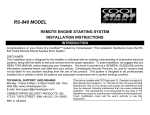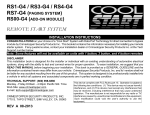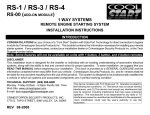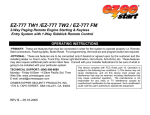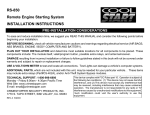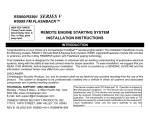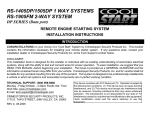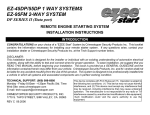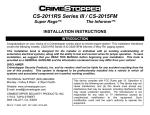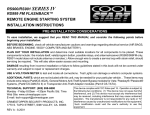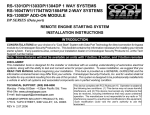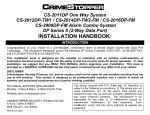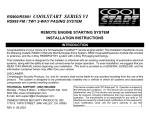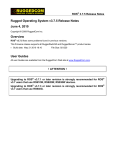Download ez-90 / ez-91 ez-777tw1 / tw2 / fm remote engine starting system
Transcript
EZ-90 / EZ-91 EZ-777TW1 / TW2 / FM REMOTE ENGINE STARTING SYSTEM INSTALLATION INSTRUCTIONS INTRODUCTION Congratulations on your choice of a Crimestopper EZEE Start remote engine starter! This installation Handbook covers the following models: EZ-90 Remote Start & Keyless Entry System, EZ-91 Upgrade/Expansion module (No remotes or antenna), and the 2-Way Systems: EZ-777TW1, EZ-777TW2 & EZ-777FM. DISCLAIMER: This installation book is designed for the installer or individual with an existing understanding of automotive electrical systems, along with the ability to test and connect wires for proper operation. To ease installation, we suggest that you READ THIS MANUAL before beginning your installation. This book is provided as a GENERAL GUIDELINE and the information contained herein may differ from your vehicle. Crimestopper Security Products, Inc. and its’ vendors shall not be liable for any accident resulting from the use of this product. This system is designed to be professionally installed into a vehicle in which all systems and associated components are in perfect working condition. TECHNICAL SUPPORT: (800) 998-6880 Monday - Friday 8:00am - 4:30pm Pacific Std. Time Web Site: www.crimestopper.com E-mail: [email protected] CRIMESTOPPER SECURITY PRODUCTS, INC. 1770 S. TAPO STREET, SIMI VALLEY, CA. 93063 REV A 08.2004 This device complies with FCC Rules part 15. Operation is subject to the following two conditions: (1) This device may not cause harmful interference, and (2) This device must accept any interference that may be received, including interference that may cause undesired operation. The manufacturer is not responsible for any radio or TV interference caused by unauthorized modifications to this equipment. Such modification could void the user’s authority to use the equipment. TABLE OF CONTENTS Pre-Installation Considerations……….………...……...……………………………………………………………….……2 Cautions & Warnings…….…………...….……..…..……………………………………………………………….…..……3 Wiring……..…………………………....……………………………………………………………………………….…….3-7 Wiring High-Current Connector…….………………...………………………………………………………………….....8-9 Power Door Lock Wiring...………………………………………….…………….……..…………...……………………10-11 Smart Tachless, Tach Reference, Tach Finder, & Timed Crank Modes…………………..…..………...…...………12-15 Diesel Glow Plug Delay..………………….…………………………………...……………………...…..…………………16 Options Programming ………..……………………….…………………………………...……………..…………………1621 Transmitter / Transceiver Programming……………………….…………………….……………..………...………...….22 2 Vehicle Operation.……………………………….……………………………………...…………………….……………23 Troubleshooting “Before You Call” Section……………..…………………………..………………….………….………24 Jumper Pin, Antenna, & System Diagrams…………………………………………………………..………….….……25-27 PRE-INSTALLATION CONSIDERATIONS BEFORE BEGINNING, check all vehicle manufacturer cautions and warnings regarding electrical service (AIR BAGS, ABS BRAKES, ENGINE / BODY COMPUTER AND BATTERY). PLAN OUT YOUR INSTALLATION and determine most suitable locations for all components to be placed. These components include: the module itself, valet/program button, possible relays, and antenna/receiver (EZ90/777TW1/TW2/FM only, EZ-91 model does not include its own antenna or remotes.) Allow enough wire to create a service loop with strain relief, should servicing be required. This will also allow easier access and mounting. DAMAGE to the EZEE unit resulting from incorrect installation or failure to follow guidelines stated in this book will not be covered under warranty and will be subject to repair or replacement charges. USE A VOLT/OHM METER to test and locate all connections. Test Lights can damage a vehicle’s computer systems. ADDITIONAL PARTS, which are not included with this unit, may be needed for your particular vehicle. . These items may include extra relays or Anti-Theft System Bypass modules. 2 INSTALLATION CAUTIONS & WARNINGS **FOR SAFETY REASONS, DO NOT INSTALL in vehicles with MANUAL TRANSMISSIONS.** If accidentally left in gear, a remote started vehicle could become a self-propelled threat to life and property. DO NOT extend the Remote start ignition harness length. Mount the module so that main harness reaches all ignition switch wiring. Extending these wires could result in poor or improper performance. DO NOT route any wiring that may become entangled with brake, gas pedals, steering column or any other moving parts in the vehicle. DO NOT exceed the rated output current of any circuit on the Remote start module. Failure to observe this warning will result in damage to the unit that is not covered under warranty. DO NOT remote start the vehicle in a closed garage! Make sure that the garage door is open or there is adequate ventilation. Failure to observe this rule could result in injury or death from poisonous Carbon Monoxide fumes. WIRING PIN 11: YELLOW/WHITE: (-) HORN CHIRP / HONK OUTPUT Connect to the LOW CURRENT Negative Horn Trigger wire usually located near the steering column. If the vehicle horn circuit requires +12V, then a relay is required. RELAY WIRING: Connect the Yellow/White wire to terminal #85, connect relay terminals #86 and #87 to +12V constant power. Connect terminal #30 to the +12V positive Horn activation wire. PIN 10: BLACK: MAIN SYSTEM GROUND Connect to chassis metal of the vehicle. An existing bolt or screw may provide an adequate ground, or drill a small hole, scrape away paint and attach using a sheet metal screw & star washer. This wire must be connected to a proper ground or undesirable and inconsistent operation will occur. Do not use Factory ground locations. PIN 9: YELLOW/BLACK: (-) IGNITION OUTPUT -or- ANTI GRIND / STARTER DISABLE OUTPUT This negative output wire is programmable and can function two different ways. It can be used as a Negative Ignition output for GM Anti-theft and Transponder Bypass modules, or it can be programmed to function as an Anti grind/Starter Disable output. As a Negative Ignition wire, this wire turns on when the remote start button is pressed and stays on through the duration of the remote start. As an Anti grind/Starter disable this wire activates when the Lock button on the remote is pressed and during remote start. When using this wire for an Anti grind/Starter disable, an optional Relay is needed to interrupt the Starter circuit. The starter disable circuit adds an anti-theft feature to this remote start system and prevents accidental grinding of the starter if key is turned to far after a remote start. See diagrams on NEXT PAGE. 3 WIRING PIN 9: YELLOW/BLACK FOR NEGATIVE IGNITION OUTPUT: (Relay and/or Module not included) ANTI-THEFT/ TRANSPONDER MODULE OR YELLOW/BLACK OR Diode isolate if using both! 85 86 30 87 +12V CONSTANT 3rd IGN (If needed) IGN SW. PIN 9: YELLOW/BLACK: FOR ANTI-GRIND/STARTER DISABLE OUTPUT: (Relay not included) TO MOTOR IGN 1 IGN 2 ACC START CUT BROWN YELLOW/BLACK 85 86 MAKE CERTAIN TO CONNECT "BROWN" START OUTPUT WIRE TO MOTOR SIDE OF ANTI-GRIND/START DISABLE RELAY. MAKE SURE 86 TERMINAL HAS POWER WITH IGNITION ON AND CRANK 4 WIRING PIN 8: BROWN: (-) AUX OUTPUT (TRUNK POP) or DOME LIGHT ILLUMINATION OUTPUT This output is programmable for two modes of operation. See Programming Option Section. Mode (1) DEFAULT: Provides a Ground pulse when button #3 (Trunk) on the remote transmitter is pushed to activate a factory electric trunk release or other optional accessory. Mode (2) ALTERNATE: Provides a Ground output for 30 seconds when the unlock button is pressed for use as a dome light illumination output. Note when using the Brown wire as a Trunk Pop, you may also need or want to program option #14 so the system also provides an Unlock signal when the trunk pop is activated. This may help to prevent unnecessary triggering of Factory Alarm systems or you may want the convenience of having the door unlock along with the trunk. BROWN WIRE: TRUNK OUTPUT or DOME LIGHT +12V CONSTANT BROWN 85 86 30 87 +12V CONSTANT OR * Trunk Soleniod (Default) -ORDome Light Circuit * Test activation circuit in vehicle. Connect to+12V for Positive circuits or Ground for Negative circuits. Relay not included. 5 WIRING PIN 7: GREEN: (-) START ACTIVATION INPUT, OEM INTERFACE or TURBO TIMER INPUT See descriptions & diagrams below. Mode (1) [Default (-) Neg. Start Activation] This wire allows a host (or parent) alarm’s or keyless entry system to activate a Remote Start by sending a 1-Second Negative signal to the Green input wire to trigger a remote engine start or stop. Connect the Green wire to the host system’s Auxiliary channel output wire. This input can also be used for outside temperature or controller input such as the optional Crimestopper RS400 “CoolTimer” module. EZ-91 EXPANSION (Default) GREEN 1 sec. (-) pulse AFTERMARKET ALARM / KEYLESS (Aux Channel Output) Mode (2) [Alternate OEM Interface] This mode allows the system to Remote Start or Stop when 3 successive Negative pulses are sent to the Green input wire. Connect the Green input wire to the Negative lock signal wire of the factory system. If your Factory OEM system does not have this type of signal, then a relay is required. EZ-91 OEM INTERFACE GREEN 3 Consecutive (-) pulses TURBO TIMER INPUT [No programming required] This wire allows the system to keep a vehicle running for 1-5 minutes [selectively] after removing the key. This mode requires the use of a momentary switch that is not included with the kit. Connect a 2-pole momentary switch with one side to chassis Ground and the other side to the Green input wire. If you own a turbo or turbo diesel vehicle, you can now allow the EZEE system to keep your engine running for 1-5 minutes after exiting/locking your vehicle to cool-down without the need for an external “Turbo Timer”. FACTORY KEYLESS MODULE New TURBO TIMER MODE Momentary Switch GREEN (Not included) NOTE: The turbo timer button will also trigger a remote start if it is inadvertently pressed when the vehicle is not running. Please note this when installing the button and choose a location out of harm’s way 6 WIRING PIN 6: GRAY: (-) NEGATIVE HOOD PIN SWITCH (REQUIRED FOR PROGRAMMING) Connect the Gray wire to a switch that is at ground when the hood is open. If an existing switch is not available, then we recommend installing the supplied pin switch. When this wire is grounded, (hood is open) remote starting is inhibited. The hood pin is also required for option and remote transmitter programming. If installing the supplied pin switch, find a location around the perimeter of the engine compartment. Do not mount pin switch in water pathways. A small Brown wire is included in the kit for use when connecting the hood pin switch. PIN 5: PINK: NEGATIVE or POSITIVE DIESEL GLOW PLUG INPUT Connect Pink wire to indicator circuit that shows a (- or +) Signal while the “WAIT TO START LAMP” is on. When this wire is used, the system will wait until light turns off before attempting a remote start. Note: This input is jumper selectable for Positive or Negative type signals. See jumper pin diagram on page 23 for configuration. PIN 4: PURPLE: (+12V) BRAKE RESET Connect the Purple wire to the side of brake pedal switch that shows +12 volts ONLY when pedal is depressed. This is the wire that turns off the remote start once the driver’s key is in the Ignition and turned to the ON position. PIN 3: ORANGE/BLACK: (-) OEM DISARM OUTPUT This wire provides a Ground pulse to disarm the vehicles' Factory anti-theft system prior to a Remote Start. Connect this wire to the vehicles' anti-theft disarm wire. This wire is sometimes found coming off the Driver's door key switch or at the Factory Anti-theft control module. This wire may not be needed if Factory Security only requires a door unlock pulse. PIN 2: ORANGE: (-) OEM REARM OUTPUT This wire provides a ground pulse to rearm the vehicles' FACTORY anti-theft system after a timed-out or aborted remote start. Connect this wire to the vehicles' anti-theft rearm wire or to the door pin circuit depending on your requirements. This wire may be needed to pulse the door pin circuit on vehicles with retained accessory power. PIN 1: RED/WHITE: TACHOMETER INPUT When installing this system Tach mode, this wire must be connected to a valid source of AC voltage. This wire allows the unit to sense the engine running and control the starter motor. See TACH REFERENCE MODE section. PROGRAM/OVERRIDE SWITCH: 2 PIN PLUG (REQUIRED FOR PROGRAMMING & LEARNING REMOTES) This switch is used for programming features, transmitters, valet mode, and to override the optional starter disable (if installed) in the event of a non-operating remote control. LED: 2 PIN PLUG (OPTIONAL) The LED is used as a VALET/PROGRAMMING indicator and it will also FLASH for use as security deterrent when the optional ANTI-GRIND/STARTER DISABLE output is programmed. 7 WIRING: 7-PIN HIGH-CURRENT CONNECTOR BROWN: +12V STARTER OUTPUT 40A: Connect to circuit in the vehicle that has power ONLY while the STARTER MOTOR is CRANKING. GRAY: +12V ACCESSORY OUTPUT 40A: Connect to circuit in the vehicle that provides Accessory Power for systems such as HEAT and A/C. Typically, this wire turns ON with the first position of the key, DROPS OUT WHEN CRANKING, then returns as the engine starts and runs. (2) RED: +12V POWER INPUT WIRES (30A Fused): Connect to both of these leads to +12V Constant Power. We recommend the Battery POSITIVE Terminal. PINK: +12V IGNITION OUTPUT 40A: Connect to circuit in the vehicle that provides true Ignition Power for systems such as Spark and Fuel. Typically, this wire turns ON with the second position of the key, STAYS ON WHEN CRANKING, and continues ON as the vehicle runs. PINK/WHITE: +12V MULTI-FUNCTION OUTPUT 40A (JUMPER SELECTABLE): This is an optional multi-function output wire the can be configured as a Second IGN, ACC or STARTER output. Some vehicles require more than just one IGN, ACC, or STARTER wire in order to start and run successfully. If this is the case for your particular vehicle, then use the jumper pin located under the access panel on the top of the EZEE control module to configure this wire to suit your needs. The DEFAULT setting is IGNITION. See Jumper Pin Diagram. WHITE: +12V or (-) NEGATIVE PARKING LIGHT OUTPUT: Connect to vehicle parking light circuit at the back of light switch or if this is not possible, connect directly to one of the parking lights at the front of the vehicle. If your vehicle has a multiplex lighting system that requires a (-) Negative parking light output, then open the access door on the top of the module and move the jumper. See Jumper Pin section. Some European vehicles require separate left and right circuits. Use a dual relay or diodes to isolate the output. Note the current limit on the Negative parking light output. You may require an external relay to prevent damage to the unit. (1) Default parking light output is +12 volts. (2) Use an external relay for vehicles that draw excess current from extra running lights, light bars, or trailers. Parking light output is limited to +10 or -.5 AMPS only. SEE DIAGRAM on NEXT PAGE 8 WIRING: 7-PIN HIGH-CURRENT CONNECTOR 7-PIN High Current Diagram not to scale, for illustration purposes only. Your vehicle may differ. Connector TOP PARKING LIGHTS RED FUSE FUSE 30A WHITE RED +10A or 500mA (-) FUSE 30A PINK/WHITE FUEL PUMP + ENGINE ECU + PINK GRAY BROWN VEHICLE BATTERY - STARTER - COIL IGN IGN 2 ACC 2 ACC OR START 2 IGN. SWITCH H/V/AC IF NECESSARY NOTE: Heavy duty/High Current Ignition circuits greater than 30 AMPS. Industrial vehicles, dual AC, etc. require highcurrent relays. DO NOT use the outputs of the EZEE system for High-Current systems or you will risk damaging the unit and creating a hazardous condition! Use Part #CS-403 relays for circuits up to 70 amps. 9 POWER DOOR LOCK WIRING CONNECTOR PIN 1: BLUE: (-) Negative pulse for UNLOCK PIN 2: RED: +12V When using external relays (TERM 86) PIN 3: GREEN: (-) Negative pulse for LOCK Crimestopper Door Lock Accessories: CS-6600DLM: Dual-relay plug-in module for Reverse Polarity, Positive, or Aftermarket Motors. CS-6500DLI: Plug-in pulse inverter that converts the Negative outputs of the system to Positive type for Positive Door Lock systems. CS-610S1: Aftermarket door lock actuator (motor). DETERMINING DOOR LOCK TYPE: We recommend determining the type of locking system the vehicle has before connecting any wires. Incorrect connection may result in damage to the alarm and/or vehicle locking system. Door lock information is provided as a guide. Your vehicle may differ. Negative Trigger (-): Many Imports; Late model Ford & General Motors Negative trigger door lock systems send a Negative (Ground) pulse to existing factory relays to lock and unlock the vehicle doors. Positive Trigger (+): Many General Motors; Chrysler / Dodge / Plymouth Positive trigger door lock systems send a Positive (+12V) pulse to existing factory relays to lock and unlock the vehicle doors. Reverse Polarity: Many Ford/Lincoln/Mercury/Dodge/Chrysler/Plymouth and early 90’s GM Trucks Reverse Polarity systems use no relays, but instead the door lock/unlock motors are controlled directly from the lock and unlock switches in the door. The lock and unlock wires rest at Negative Ground when not in use. When the lock or unlock button is pressed, one of the circuits is “Lifted” and replaced with +12V causing a lock or unlock to occur. Single Wire (Dual Voltage): Late model Chrysler/Dodge/Plymouth Vehicles, some 2000-UP GM Dual Voltage systems have lock/unlock switches that send varying levels of Positive voltage OR Negative ground current to the SAME wire for both lock and unlock. When the vehicle’s Body Computer Module (BCM) or door lock module senses different voltages on this wire, the system will either lock or unlock. Single wire door lock systems require relays and resistors. Databus Systems 2003-UP GM Trucks & SUV’s, ‘99-04 Jeep Grand Cherokee Databus systems send low current “Data messages” to the door lock controllers on a network in order to lock and unlock the vehicle. To install aftermarket systems in these vehicles, an interface module is required that converts the regular lock/unlock pulses into “Data messages” to allow locking & unlocking. Interface modules are sold separately. 10 BASIC DOOR LOCK DIAGRAMS NEGATIVE TRIGGER DOORLOCK WIRING POSITIVE TRIGGER DOORLOCK WIRING GREEN GREEN RED RED BLUE BLUE FUSED +12V + 85 86 87 87A 30 FACTORY POWER LOCKING RELAYS L UL BLUE 85 86 87 87A 30 85 L UL FACTORY POWER LOCKING RELAYS AFTERMARKET MOTOR/DOOR LOCK WIRING GREEN FUSED +12V + RED BLUE 85 86 86 87 87A 30 87 87A 30 MASTER SWITCH + 87 87A 30 UL FUSED +12V + RED 86 L REVERSE POLARITY DOOR LOCK WIRING GREEN 85 CUT CUT 11 85 86 87 87A 30 “SMART TACHLESS” MODE Your EZEE system includes a unique voltage monitor called “Smart Tachless” mode. This mode allows this unit to efficiently start an engine without the use of a tach signal wire. These modules actively monitor the voltage level of the vehicle to control the starter motor each time a remote start is requested. IMPORTANT NOTES: (1) SETUP may be required for the EZEE “Smart Tachless” Mode. If your vehicle has not been at rest for a period of time (Hot engine), then you must drain the surface charge from the battery. Unplug main power harness from unit, turn HEADLIGHTS ON for 4 minutes to drain off excess surface charge on vehicle’s battery then reconnect. (2) On the rare occasion that “Smart Tachless” mode does not operate satisfactorily, change the voltage reference level as described below, or use a different mode such as “Tach” mode, or “Timed Crank” mode. “SMART TACHLESS” ADJUSTMENT: In the event “Smart Tachless” over-cranks or under-cranks your starter, the settings can be changed. The purpose of adjusting the “Smart Tachless” Mode is to raise or lower the voltage reference threshold from the 93% default point. Raising or lowering this 93% point should increase or decrease your cranking time respectively. The adjustment range is from 80% to 100% in one percent increments. Follow steps below to adjust the reference level. 1. 2. 3. 4. Open hood (or ground Gray wire if no hood pin is installed) Turn the key to the ON position Press program button 5 times, after a few seconds the unit will flash the lights 5 times. Carefully press the program button 21 times to get to option level 21. You must get a light flash after each press. If the lights didn’t flash, then the unit did not register your button press. Only count the light flash. 5. Press the Lock Button #1 on the remote to decrease by 1% (lights will flash 1X for each press); Press the Unlock Button #2 to increase by 1% (lights will flash 2X for each press); Press the Trunk Button #3 to reset to 93% (lights will flash 3X). The unit will stop providing light flashes when you reach the bottom (80%) or the top (100%) of the adjustment range. If you lost track, then just press Button #3 to reset back to 93% and begin raising or lower again. 6. Turn Ignition OFF, Close hood (or un-ground the Gray wire) and check operation. NOTE: This Smart Tachless adjustment feature is not available on the EZ-91 Model that has no remote transmitters or antenna. If you must use this feature on an EZ-91, then a remote and an antenna module from an EZ-90 must be used to set the desired level. Once programmed, removed antenna. 12 TACH FINDER & USEFUL TIPS TACH FINDER MODE: This Tach Finder mode can assist in locating a Tach source for your installation. When following the steps, the unit will begin to flash the parking lights if you have the Red/White wire connected to a tach source. If lights do not flash, then try another wire until you locate a tach signal that will cause the Parking lights to flash. NOTE: On some vehicles equipped with daytime running lights, it may be difficult to see any flashing parking lights. In this case your only notification will be the slight “ticking” sound coming from the module’s flashing light relay. TACH FINDER STEPS: 1. Open hood (or ground Gray hood pin wire if no hood pin is installed) 2. Start Engine with the key. 3. Press the Program button for 2 seconds 4. Lights will begin flashing if the Red/White wire is connected to a valid tach source. If not try a different tach wire. 5. Once Tach is located then turn off engine and close hood to abort (Remove Gray wire from ground). 6. Now follow the Tach Programming steps. \ TACH FINDER TIP: Erratic vs. Consistent light flashing When using the tach finder mode to find a tach source, your EZEE system may flash the lights erratically. Erratic light flashing indicates that the system is sensing and tach pulse, but it is not programmed into memory. To correct, this issue, follow the tach programming steps. Once the Tach is programmed, you can go back into the tach finder mode and lights should have consistent light flash (like directional or emergency flashers). Re-checking your programmed tach signal WILL NOT erase it from the memory. TACH FINDER TIP: Cold Weather / High Idle Simulation: The tach finder mode can also be used to help determine how your EZEE system may operate in a cold weather situation. Once you have a valid tach source programmed into your system, follow test steps below. 1. 2. 3. 4. Go back into the tach finder mode. You should have a consistent light flash (like directional or emergency flashers). Slowly raise the RPM level on your vehicle to simulate a “warm-up idle” that is higher than the normal idle level. If and when the lights STOP flashing, [and become SOLID]. Note that this is the point at which the tach signal is out of range of the system. 5. We recommend that you bring the RPM level up to between 1500 and 2000 RPMs to simulate a cold morning idle. 6. If the lights stop flashing too quickly, then we recommend using another tach source. This may help prevent the engine from starting and stalling in the morning or cold. 13 TACH PROGRAMMING & TACH SIGNALS INTRODUCTION Tach signals will vary in levels and frequencies depending on many factors including the type of vehicle and the source of the signal. The signals from a vehicle’s injector wire and coil pac wire can vary greatly even on the same engine. The tach signal from an engine can also affected by other sources such as electronic noise from the ignition or computer modules. Recent improvements have been made to the circuitry to allow this EZEE system to sense a wider range of tach signals than previous models. TACH MODE The Tach mode provides reliable remote starting performance though engine speed (RPM) sensing. When using Tach Reference Mode, the Red/White wire is used for Tach signal [Engine RPM] input. Most modern engines include various points where the Engine Speed [Tach] or A/C signal may be obtained. Tach Signal examples: Negative (-) side of ignition coil, at the Distributor or Ignition Control Module, Coil Pack, Engine Computer, or Crankshaft Sensor. Sometimes Fuel injectors, and Alternator stator pins can be used. These Tach Signal locations mentioned are provided as a guide, your vehicle may differ. Some locations will NOT be a good location for Tach source due to RF noise or Computer Data. TACH PROGRAMMING: 1. Open hood (or ground Gray hood pin wire if no hood pin is installed.) 2. Red/White wire should be connected to a valid Tach source. 3. Start engine with key. 4. Press program button 5 times, then wait for 5 light flashes. 5. Push program button again once. (You must get one light flash after button is pressed.) This unit is now at option #1-Tach Learning. 6. Press the #1 Lock Button on remote transmitter. The unit will read the Tach source and flash the lights once for program confirmation. (On EZ-91 models without remote transmitters, press the brake pedal in this step.) 7. If lights do not flash for confirmation, then try another tach source or try the tach finder to locate another wire. EXAMINING THE TACH FREQUENCY WITH A DIGITAL MULTI-METER (Hz Setting) If you own a Digital Multi-Meter meter with a frequency counter setting, it can be helpful to measure and research the range of tach signal from your particular engine. When probing your chosen tach wire, observe the frequency reading from the meter at both the warm/low engine idle and cold/high engine idle points. Tach signals ranging between 70Hz and 700Hz are desired. If your tach wire has readings that are not in this range, the unit may not operate properly. The frequency of the tach wire in this range does not guarantee operation. If you cannot locate a good tach source from your engine, then you can switch your EZEE system to the “Smart Tachless” or “Timed Crank”. 14 TIMED CRANK MODE This feature provides an easy method of starting the vehicle without locating an exact tach wire. The system uses a timed cranking output combined with the use of the Red/White tach wire as an engine ON/OFF monitor. The Red/White Tach wire must still be used in this mode of operation. THIS FEATURE MUST BE PROGRAMMED BEFORE USE! THERE ARE 2 LEVELS of programming required: First, set the system for “Timed Crank” operation, and secondly you may need to adjust the amount of cranking time. There are 4 different crank times available for use. SEE OPTION PROGRAMMING CHART ON PAGE 17-18 FOR SETTINGS. HOW TO USE THIS FEATURE: 1. Go to the “Programmable Options” section of this manual, and turn “ON” Option #15 "Timed Crank". (It is normally on Tach Monitor) 2. With “Timed Crank” turned ON, you will STILL have to connect the Red/White Tach wire to a tach source on the engine. The Red/White Tach wire becomes a simple “Engine Monitor”. Although the unit will not be using the Red/White wire to start the motor, it will be using this wire to determine whether the motor is running or not. This is a mandatory connection. A “crude” or “less exact” tach source can be used only when in “Time Crank” mode. 3. Using the vehicle key, start the engine a few times to get a “feel” of how long the cranking time is. Once the “Timed Crank” mode is turned on, the default cranking time is set to a default of 0.50 seconds. We recommend beginning with this setting. Try a remote start and see if the cranking is appropriate for your vehicle 4. If 0.50 seconds is not an appropriate starter cranking time, then go to Programming Option #18 and change the crank time setting to a longer value. The values are as follows: 0.5, 0.75, 1.0, and 1.5 seconds. WARNING: This method of starting the vehicle is not as reliable as using regular “Tach” or Smart Tachless modes. This method should be used only in the event that a tach wire cannot be located using the normal tach programming and tach finder. When using this method, there may be certain operating anomalies requiring seasonal adjustments. These are, but not limited to: • Starter may under-crank in extreme cold weather. Vehicle may not start on 1st attempt and may require a 2nd or 3rd try. • In warm weather when your vehicle may start very quickly, “Timed Crank” mode may tend to over-crank the starter. • The only way to correct the above issues is to go to Option #18 and adjust the cranking time. • When in “Timed Crank” mode, the cranking time can only be adjusted manually through option #18. When the system is in Tach or Smart Tachless modes the cranking time is controlled automatically by the microprocessor. 15 DIESEL GLOW PLUG DELAY This feature provides a solution for diesel vehicles without having to connect to the Glow Plug-“Wait to Start Circuit”. This may be needed for various reasons. If your vehicle does not have a viable “Wait to Start Circuit”, or you cannot locate and identify the circuit, then change your system to “Diesel Glow Plug Delay” mode. You can choose from a selection of “pre-cranking” delay times. Once this mode is activated, the system will NO LONGER monitor the PINK glow plug input wire and will use a delay setting chosen by the installer in the option chart. NOTES: This feature is OFF by default and must be programmed before use. Once this feature is turned ON, the Pink Glow plug input wire is not used. The Remote start unit will always wait the programmed time before cranking EVEN IF the glow plug warms up first. There are 3 different Delay times available for use: 10, 20, or 30 seconds. SEE OPTION PROGRAMMING CHART on Pages 17-18. HOW TO USE THIS FEATURE: 1. See the “Option Programming” section on Pages 17-18 and change Option #19 from "Monitor Glow Plug Light" to one of the delayed time values. (Default setting is to always monitor the PINK Glow Plug input wire.) 2. Once this option has changed, the system will wait for the selected time before cranking. OPTIONS PROGRAMMING This EZEE unit has over 20 programmable control options to customize the system for various operating features and installer preferences. Examine the chart on the pages 17-18 along with reading the descriptions that follow on pages 18-21. You may change one option at a time, or program multiple options in one session. If you start with the lowest option and continue on to higher options, you do not need to repeat steps #1-3 each time. For example, you can change Option #2 to “ON”, then you can continue pressing the program button to get to a higher number option and change it as well. You can only go from low to higher options numbers in one session. OPTION PROGRAMMING CHART BEGINS ON NEXT PAGE 16 OPTIONS PROGRAMMING To Engage Option Programming: 1. Open hood (If no hood pin switch is installed, then ground the Gray wire) 2. Turn Key to the ON position. (Do not start vehicle) 3. Press the valet/program button 5 times. After a few seconds the unit will flash the lights 5 times. 4. Press the valet/program button [again] the number of times that corresponds to the option number desired (122X). You must get a light flash after each button press. If the system did not flash the lights, then it did not register your press. Press carefully and do not lose count. 5. A) For EZ-90/777: When you reach the desired option #, Press button #1(Lock) or #2 (Unlock) to change the option. (Some option numbers use ALL 4 remote buttons to select settings) 5. B) For EZ-91 (No remotes) Tap the brake pedal to toggle through the option values: Tap the brake once (lights flash 1X; Tap the brake pedal again (Lights flash 2X) tap 3 or 4 times for options that have 3 or 4 values. 6. When finished, turn Ignition OFF, close hood (or un-ground Gray wire) and check for changed features. Option # 1. 2. 3. 4. 5. 6. 7. 8. 9. 10. Option Description Option Values Engine Monitoring Autolock with RPM/Ignition Door Lock Pulse Time Tach (Engine RPM) or Tachless ON or OFF. 0.75 Sec. (Standard) OR 3.0 Sec. (European Vacuum) Single or Double Unlock Pulse Remote Start w/Single Pulse or 3 Pulses on Green input wire ON or OFF ON or OFF ON or OFF Double Unlock Pulse OEM Interface (RS901 MODEL ONLY) Passive Starter Disable Horn Chirps on remote start Lock During and After Remote Start Abort Tan Wire Output function “Wake up” Pulse on Lock Unlock (1-sec +12V to IGN) OPTIONS CONTINUED ON NEXT PAGE> Trunk or Dome Light Output ON or OFF 17 * = Default Value Button #1 Button #2 LOCK UNLOCK Tach Tachless* ON *OFF 3 Sec. *0.75 Sec. Double 3 pulse *Single *1 Pulse ON ON OFF *OFF *OFF *ON Dome ON *Trunk *OFF OPTIONS PROGRAMMING 11. 12. 13. N/A - Not used Yellow/Black Wire (-) Horn Chirp Confirmation with 2 presses of Lock/Unlock Unlock/Disarm with Trunk pop activation N/A – Not used (-) IGN output or (-) Anti-Grind ON or OFF Anti-Grind OFF *IGN output *ON Trunk Pop & Unlock or Trunk Pop Only Trunk Pop & Unlock *Trunk Pop Only 15. Timed Crank Mode or Tach Monitor Timed Crank *Tach Monitor 16. Adjustable Horn Pulse Long *Normal 17 18. OEM Disarm/Unlock Pulse Starter Cranking Time (Only when option #15 is set for “Timed Crank”) Short 0.75 Sec *Normal *0.5 Sec 19 Diesel Glow Plug Delay 10 Sec. * Monitor Glow Plug circuit 20. Remote Start Engine Run Time 12 Min. *24 Min. 21. Smart Tachless Voltage Adjust 80-100% (Only when Option #1 is set to “Tachless”) -1% +1% 22. Option reset Timed Crank: Pre set crank time Tach Monitor: Use Tach Pulses 0.02 sec. Normal or 0.04 Longer 0.75 sec. Normal or 0.5 Shorter Button #1 = 0.75 Sec. Button #2 = 0.5 Sec. Button #3 = 1.0 Sec. Button #4 = 1.5 Sec. Button #1 = 10 Sec. Button #2 = Monitor Glow plug Button #3 = 20 Sec. Button #4 = 30 Sec. Button #1 = 12 Min. Button #2 = 24 Min. Button #3 = 36 Min. Button #4 = 48 Min. Button #1 = Decrease by 1% increment Button #2 = Increase by 1% increment Button #3 = Reset to 93% (Default) Button #2 14. 18 Reset to Default OPTIONS PROGRAMMING OPTION DESCRIPTIONS: 1. Engine Monitoring: This option sets how the unit monitors your engine. You can program either for Tach mode in which the unit uses a Tach signal (RPM) or for Tachless mode that monitors voltage level. See pages 11-15 for more information and additional steps for actual Tach learning and Tach finder modes. 2. Auto Lock/Unlock (Improved): The option controls whether the doors will automatically lock/unlock on your vehicle when driving or with turning the Ignition ON/OFF. If the Auto Lock feature is turned on, and the system is in Tach mode, then the doors will lock as the engine RPM’s increase (driving). If the Auto Lock feature is turned on, and the system is in Smart Tachless mode, then the doors will lock when the Ignition is turned on. When the Auto Lock feature is turned on, the system will unlock the doors when the Ignition is turned off. With this feature OFF, the system will not automatically lock or unlock the vehicle. 3. Door Lock Pulse Time: Controls the amount of time for lock/unlock pulse. The standard setting is 0.75 for most vehicles. A 3 sec. setting is required for 1980’s/90’s European Vacuum or Pneumatic door lock systems. 4. Double Unlock Pulse: The unit will send 2 unlock pulses when the #2 Unlock button is pressed. This feature may be required for interfacing this alarm with an existing Factory Keyless Entry or Alarm system in a vehicle. These systems are found on some Nissan, VW, Toyota, and Lexus vehicles. 5. OEM Interface (EZ-91 Add-on Model): This option controls this input selection for the Green Negative Start Trigger Wire. When using an Aftermarket Host Alarm or Keyless Entry System: Leave the setting as “1 pulse” and connect the Green wire to the (-) Auxiliary output wire of the Alarm or Keyless Entry System. For Factory Keyless entry systems (without a (-) Negative auxiliary output), change the option to “3 Pulse” and tap the green wire into a Negative signal wire on the vehicle such as a Negative door lock wire. Pressing the Factory remote lock button 3 times will produce 3 short negative signals to trigger a remote start. 6. Passive Starter Disable: Note: Yellow/Black Negative Output must be programmed as an “Anti-Grind” for this feature. See option #12. This option controls the unit’s Negative Anti-Grind output allowing it to come on automatically 1 min after the ignition has been turned off. Note if you set this system up for a Passive Starter Disable/Anti-Grind, you must use the remote control UNLOCK button when returning to the vehicle to deactivate it or vehicle will not start with key. 19 OPTIONS PROGRAMMING 7. Horn Chirps on Remote Start: This option allows the unit to provide 3 short chirps when for audible confirmation of a remote start. The horn output wire must be connected for this feature. 8. Lock During/After Remote Start: This option controls whether the unit will automatically lock during and after a remote Start abort or time-out. 9. Brown Output Wire Function: Trunk Pop or Dome Light Output This option controls how the Brown output wire of the unit functions, either for Trunk pop or for Dome light illumination. 10. +12V “Wake up” Pulse: This option allows the unit to provide a 1-second pulse on the Pink main ignition output when unlocking. The Ignition pulse serves to “Wake up” vehicle control modules or body computers that “time out” or go into power saving mode. This is required on many late model Ford vehicles with a “Slam” lock system in order to actually unlock the vehicle after it has been shut down for a short period of time. 11. Not used 12. Yellow/Black Wire Function: (-) Negative IGN or ANTI GRIND / Starter Disable Output This option controls the units Negative multi-function output. Default: Negative IGN output that turns ON and stays on for the duration of the remote start. Use this wire to turn on Anti-theft bypass adapters for GM or Transponder systems. When changed to an Anti Grind, this output activates when the Lock button on the remote is pressed and activates during a remote start. Anti Grind is designed for use with an optional Starter disable relay (Not included). 13. Horn Chirp Confirmation with Double Lock/Unlock Press (When Optional Horn Output installed): This option allows the system to chirp the vehicle horn for Lock/Unlock confirmation when the Lock or Unlock Button on the remote is pressed a 2nd time within 3 seconds. The horn output must be connected to use this feature. 14. Unlock With Trunk Pop or Trunk Pop Only: This option controls whether the system will provide an Unlock/Disarm pulse when the Trunk release is activated from the remote control. This may be required to prevent unnecessary triggering of a factory alarm on some vehicles. 15. Timed Crank Mode or Tach Monitor: This option controls whether the system uses a tach wire to control the starter or uses a pre-set starter cranking time. 16. Adjustable Horn Pulse: Some vehicles require an extended horn pulse to activate the Factory horn. Use this option #16 to EXTEND the horn pulse slightly as required by your installation. 20 \ OPTIONS PROGRAMMING 17. OEM Disarm / Unlock Pulse: Some vehicles (namely Nissan and VW) require a shorter setting prevent the vehicle from attempting to roll down the windows due to the length of the UNLOCK and/or DISARM pulses. Use this option to SHORTEN the OEM Disarm/Unlock Pulses should your vehicle require this. Symptom: Windows will slightly vent or begin to roll down when unlocking. 18. Pre-Set Starter Cranking Time: (Requires Option #15 to be set to “Timed Crank”) This option controls the starter output cranking time. Choices are 0.5, 0.75, 1, or 1.5 seconds. 19. Diesel Glow Plug Delay: This option controls the system’s Diesel vehicle interface. Using this option you can control whether the unit monitors the vehicle’s glow plug circuit using the Pink input wire (Default), or you may select a specific delay time before cranking. This option is helpful if you are unable to locate a glow plug signal. Just select a delay time and do not connect the Pink Glow Plug wire. Selections: 10, 20, 30 seconds, or Monitor Pink Wire (Default). 20. Remote Start Run Time: This option controls the engine run time for remote start. Use the buttons on the remote control set a choice of 12, 24, 36, or 48 minutes. The default setting is 24 minutes. 21. Smart Tachless Voltage Adjustment: This option controls the voltage reference point when using smart Tachless mode. Pressing the Lock or Unlock buttons on the remote raises or lowers the reference level in 1% increments from 80%-%100. Button #3 resets the unit to the factory default reference point of 93%. The default 93% setting works for most vehicles. See page 12 for additional Smart Tachless mode information. 22. Option Reset: (RESTORE TO DEFAULT) This option allows you to restore all programmable options to factory default values. Go to the option 22 and press the Unlock Button #2 on the remote. The unit will flash the lights 2 times and all values will be reset to factory original settings. Default values are marked with asterisks in the chart on pages 17-18. 21 EZ-90 TRANSMITTER / 777TW1/TW2/FM TRANSCEIVER CODE LEARNING Transmitter/Transceiver Code Learning: (Excludes EZ-91 model without remotes) Notes: Remote Transmitters/Transceivers come pre-programmed from the Factory. When re-learning remotes or adding remotes, ALL your system’s remote codes must be learned at time of programming!! These systems allow storage of up to 4 different remote codes in memory. The EZ-777TW1/TW2/FM systems include both an LED or LCD 2way remote and a “Sidekick” 1-way remote transmitter. “Sidekick” transmitters for the TW1/TW2/FM systems are special units which are not compatible with standard EZ-90 remotes. EZ-90 and EZ-777TW1/TW2/FM remotes are not interchangeable. 1. 2. 3. 4. Open hood (ground the Gray hood pin wire if no hood pin is installed.) Turn key to the ON position. (Don not starting vehicle) Press Program/Valet button 4 times. After a few seconds, the unit will flash the parking lights exactly 4 times. EZ-90: Press Button #1 (Lock) of the transmitter to be learned. EZ-777TW1/TW2/FM: Both the Lock & Unlock buttons must be pressed. You should get 2 light flashes indicating the code-learn. Now the unit is waiting for a 2nd code, so repeat this step as needed with up to 3 additional remotes. The unit will flash the lights in succession after each code learned for up to 4 codes. (2 flashes for the 2nd code, 3 flashes for the 3rd code etc.) If all 4 codes are learned, the unit will automatically exit code learning mode, otherwise turn key OFF and close the hood. (See Diagram Below) TIP: When learning 2-Way LED or LCD remotes, wait for a confirmation beep before learning the next remote. IGN OFF WAIT FOR 4 FLASHES (GRAY WIRE GROUNDED) PRESS 4X's EZ-777 2-WAY SYSTEMS EZ-90 & "SideKick" REMOTES IGN OFF FLASH 2, 3, or 4 X's PRESS LOCK ONLY COMPLETE LOCK & UNLOCK PRESS TOGETHER 22 2-VEHICLE OPERATION The EZ-90 system can be used for 2 vehicle operation. A single remote can control two independent vehicles with identical systems installed. NOTE: The EZ-90 and EZ-777 systems ARE NOT interchangeable. An EZ-90 system remote CANNOT control an EZ-777TW1/TW2/FM and vice versa! See diagram below on how to switch your remote(s) to vehicle #2 operation. To set up the 2-Vehicle operation you must first program your remotes to Vehicle #2. Follow the “Transmitter Programming” steps at the second vehicle and learn YOUR remote, along with vehicle #2’s existing remotes. VEHICLE #2 Press side button first, then you have 3 seconds to control vehicle #2. 23 TROUBLESHOOTING: “BEFORE YOU CALL” SECTION UNIT WILL NOT ATTEMPT A START (KEYLESS ENTRY FUNCTIONS NORMALLY): The unit is in Valet mode. Turn IGN ON, press and hold valet/programming button for 5-6 seconds then turn key off. Unit is now out of valet mode and should remote start. If optional LED is installed, then it will be on solid when in Valet. SYSTEM IS UNSUCCESSFUL AT REMOTE START DURING EXTREME COLD CONDITIONS: Please be aware that during sub-freezing conditions your remote starter may take more that one attempt to start, or it may not successfully start the vehicle after 3 attempts. During these conditions the vehicle may not properly start even using the key, therefore trying to start by the remote would also be unsuccessful. UNIT FLASHES LIGHTS ONCE AND WILL NOT ATTEMPT A START: The unit senses a fault at the Brake (Purple wire is active) or the Hood is OPEN (Gray wire grounded). This is a safety feature of the unit. Check installation for faults and make sure hood is closed and latched and brake wire is not active. UNIT CRANKS VEHICLE BUT ENGINE NEVER STARTS: • In some vehicles, there may be a Factory anti-theft system that will not allow the engine to run without the key in the ignition. These systems may include Factory Security Modules, GM Passkey®/Passlock®, and RF Transponder systems (Ford P.A.T.S.®). Many late 1990’s through 2005 vehicles include some type of Anti-Theft system which may require a bypass module. • The vehicle may have more than one Ignition or Accessory circuit that requires power for the vehicle to start. This is common on many late model vehicles. VEHICLE STARTS BUT CHECK ENGINE LIGHT COMES ON OR ENGINE RUNS BADLY: • Many 1995-UP General Motors cars/trucks require a secondary ignition circuit for the Transmission computer and other on board systems. If the vehicle is started without this wire energized, there may be a “Check Engine” or “Service Engine” light on the dash. This may cause damage if the vehicle is driven in this condition. Be sure to check for an additional WHITE (or sometimes GREEN) Ignition wire on GM cars and trucks. Connect the Pink/White IGN#2 wire to this circuit in the vehicle. • Some Vehicles (Commonly Nissan) require 2 Start (Cranking) circuits for the vehicle to run properly. If this is the case, then use the PINK/WHITE output of this system to power the Starter #2 circuit of the vehicle. See Jumper pin diagram for configuration. Note that the secondary starter wire may be a smaller gauge wire than the primary starter wire. NO RESPONSE FROM REMOTE TRANSMITTER (EZ-90/EZ-777TW1/TW2/FM): 1. Check antenna connection: Antenna must be plugged in (3 pin black plug on side of module). 2. Verify if remotes are programmed to module, otherwise perform transmitter learning steps. 24 JUMPER PIN DIAGRAMS Jumper pins are used to change/configure the operation of the on board multi-function output PINK/WHITE wire, the Parking Light WHITE wire and the PINK glow plug input wire. See the diagrams below for Jumper Pin configurations. CONTROL MODULE ACC 2 IGN 2 (DEFAULT) STARTER 2 (-) NEGATIVE PARKING LIGHT (500 mA) +12V (10A) PARKING LIGHT (DEFAULT) JUMPER PLUG JP1 JUMPERS: IGN2 / ACC2 / STR2 PINK WHITE SIDE VIEW JP2 JUMPERS: PARKING LIGHT OUTPUT GLOW PLUG PINK WIRE: Jumper Select for Postive or Negative 25 Type "Wait" Circuits JUMPER PINS ANTENNA DIAGRAM ANTENNA LOCATIONS WINDSHIELD Blue Plug EZ-90 EZ-777TW1 EZ-777TW2 EZ-777FM Color of plug and receptacle must match!! Black Plug 26 TRANSMISSION ECU ENGINE ECU FUEL PUMP NOTE: USE EXTERNAL RELAYS FOR HIGH-CURRENT (GREATER THAN 30A) IGNITION CIRCUITS. A/C - HEAT CONTROL ACC IGN STARTER START #2 JUMPER SELECT (See page 23) IGN #2 or ACC #2 or STR #2 (Only if necessary) STARTER +/- PARKING LIGHT JUMPER BROWN GRAY RED RED PINK PINK/WHITE EZ90/91 EZ-777TW1/ TW2/FM + 30A FUSE FUSE 30A PARKING LIGHTS WHITE +10A or -.5A OUTPUT FUSE 10A YELLOW/WHITE (-) HORN CHIRP / HONK BLACK GLOW PLUG FACTORY HORN GROUND (-) IGNITION or ANTI-GRIND RELAY OUTPUT YELLOW/BLACK (-) AUX. (TRUNK POP) or DOME LIGHT BROWN ANTENNA/RECEIVER PLUG (-) NEGATIVE ENGINE START / STOP or TURBO TIMER INPUT GREEN (-) START ACTIVATION (OPTIONAL) GRAY DIESEL WAIT TO START LAMP (-)HOOD SWITCH LED PINK + / - GLOW PLUG INPUT WAIT PURPLE (+12V) BRAKE PEDAL RESET PROGRAM SWITCH (-) UNLOCK OUTPUT BLUE +12 V FOR RELAYS RED (-) LOCK OUTPUT ORANGE/BLACK: (-)OEM DISARM ORANGE: (-)OEM REARM 2 TACH INPUT 27 3 0 TACH 4 5 6 7 8 1 RED/WHITE GREEN - VEHICLE BATTERY www.crimestopper.com [email protected] Phone (800) 998-6880 FAX (805) 581-9500 © 2004 Crimestopper Security Products ONLINE TECHNICAL SUPPORT www.crimestopper.com/techweb03.html




























